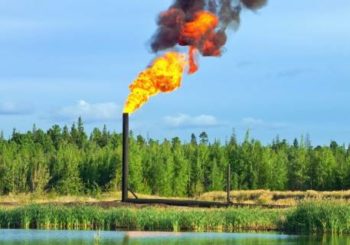
The House of Representatives has initiated a move on the need to stop gas glaring in the country by 2020. The lawmakers said the move became necessary due to the health and economic implementations on the country as well as the refusal of international oil companies (IOCs) operating in the Niger Delta region to comply with regulations on flaring.
As a consequence, while calling on the Federal government and IOCs to stop the flaring, the House has mandated its Committees on Gas Resources and Petroleum Resources (Upstream and Downstream) to interface with the Ministry of Petroleum Resources and the Department of Petroleum Resources (DPR) on government policies and regulatory rules towards actualizing the exit date of 2020 for gas flaring in Nigeria.
The decision of the House followed the adoption of a motion by Ehiozuwa Agbonayinma (PDP, Edo), who noted that data obtained from the World Bank showed that Nigeria ranks second among countries that are the largest gas flaring nations in the world, as the country emits over four(4) billion dollars’ worth of gas annually.
He said: “The Nigerian Extractive Industry Transparency Initiative (NEITI), in its 2014 Nigerian Oil and Gas report disclosed that in 2008, the Federal Government, in its fiscal regime for the petroleum sector, set a penalty of $3.5 per 1000 SCF of gas flared by oil companies, observing, however that the companies have refused to comply with the directive.
“We are all aware that gas flaring results in the release of methane which is accompanied by other greenhouse gases that account for about 50 percent of all industrial emissions in the country and 30 percent of the total C02 emissions which are harmful to humans, the economy and the environment.
“Regrettably, the failure of the Government to enforce the laws against gas flaring has exposed humans to various respiratory disorders, harmed the environment and cost the country over N3 trillion in revenues over a five year period.
“It should also be noted that as much as conversion of gas that is currently flared is not just about penalties, there is need to provide a conducive legal and regulatory environment, and also the infrastructure to take the gas harnessed to end users which is obtainable in other climes where 90 percent of associated gas is used or re-injected into the ground, rather than flared.
“We should take cognizance of the figure from DPR that gas flared in 2015 alone was capable of generating about 3,500 MW of electricity or an equivalent of three trains of Liquefied Natural Gas (LNG), representing a loss of over $1bn revenue or over 60 million barrels of oil equivalent.
“We should be concerned that lack of political will on the part of the Government to enforce the laws on gas flaring is capable of thwarting Governments projected exit date of 2020 to end gas flaring, and given that the year is almost at hand, there may be need for increased fines and penalties to achieve the exit date.
“However, doubts have been expressed by industry players that Government officials are not taking aggressive steps that are required to actualize the 2020 exit date”.
Following the adoption of the motion, the Committee was given eight weeks to carry out the assignment and report back for further legislative action.
